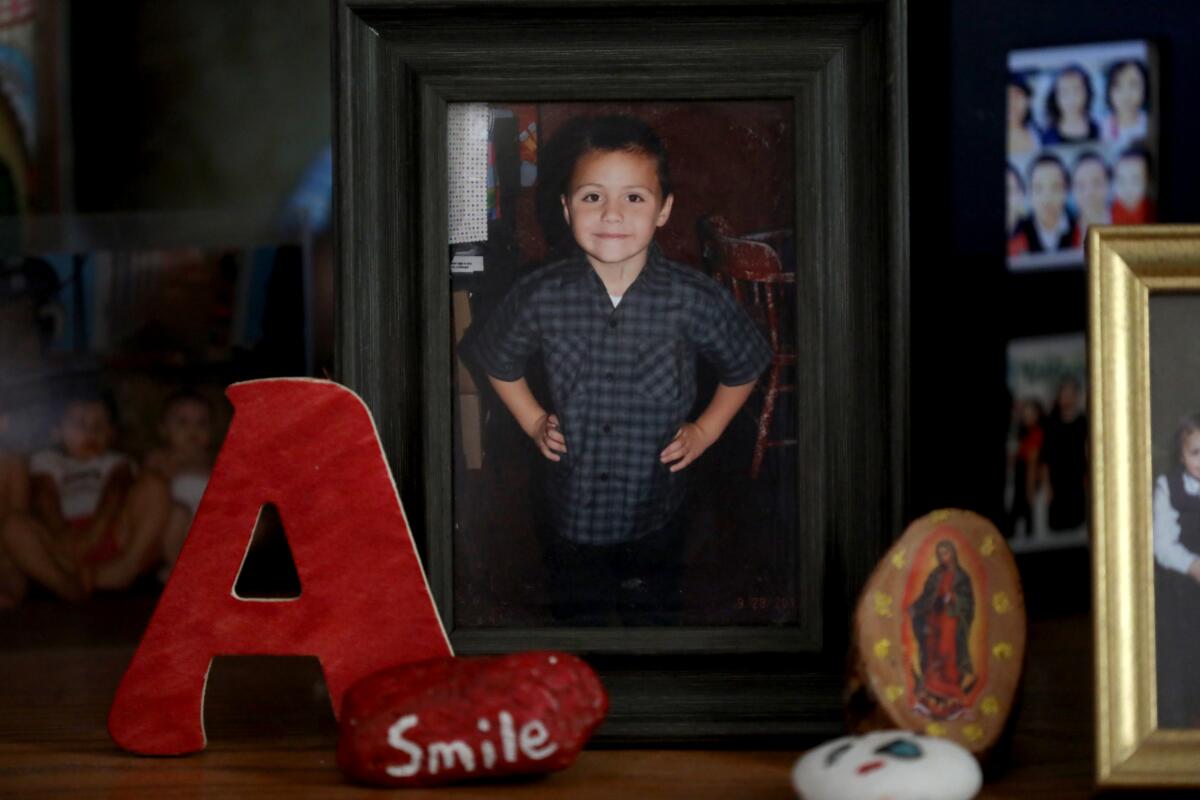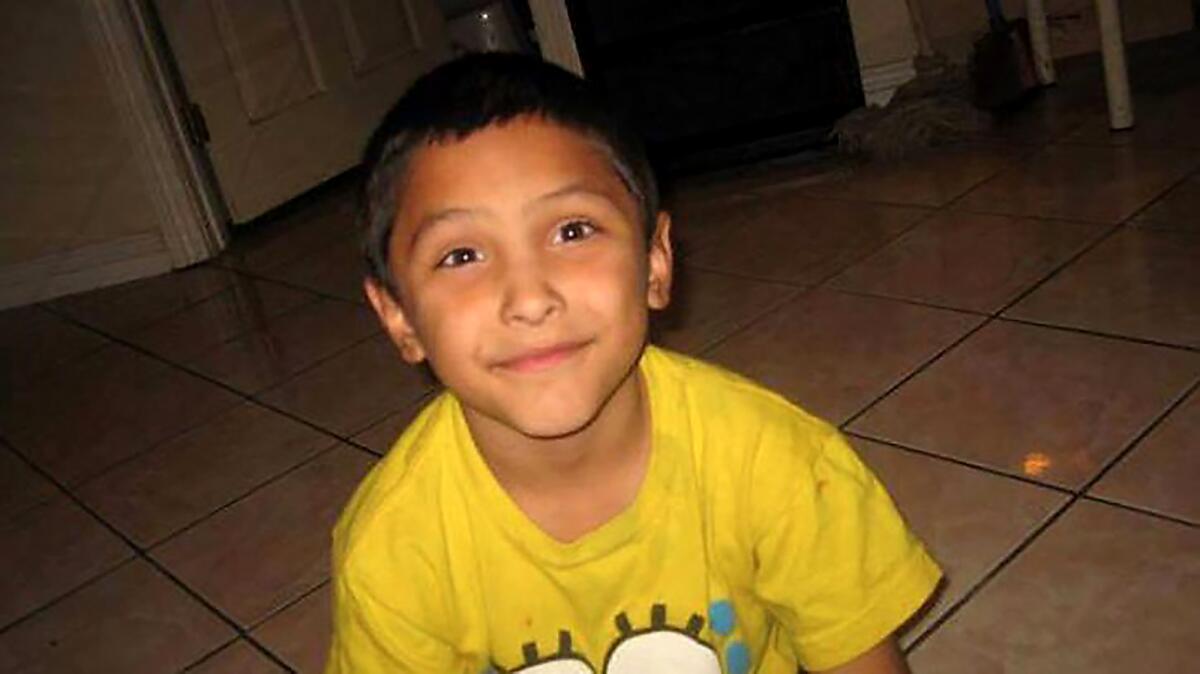Parenting classes are routinely ordered in child abuse cases. California isn’t ensuring they work

- Share via
SACRAMENTO — Before they were charged with torturing and murdering their 4-year-old son, Ursula Juarez and Jose Cuatro were ordered by a court to complete classes meant to teach them how to be better parents.
For 12 weeks in 2017, court records show, they each attended parenting classes as part of their case plan with the Los Angeles County Department of Children and Family Services in an effort to regain custody of their toddler, Noah Cuatro, who was taken by the state after allegations that another child in the home had been abused.
Juarez attended “culturally relevant” classes held at a community resource center in Palmdale that taught parents how to instill responsibility and “discipline with love,” according to a description of the program named in Los Angeles County Superior Court records. The records show Cuatro attended classes at a church, where a pastor taught parents how to create structured schedules and to use prayer to cope with family stress.
Juarez and Cuatro submitted certificates of completion of those classes to officials, a factor considered when a court commissioner ruled in 2018 that it was safe for Noah to be in their care.
By 2019, the tiny boy with big brown eyes and bouncing curls was dead. An autopsy ruled that the cause was suffocation, and found numerous injuries, including rib fractures caused by “significant force.” It was a month before his fifth birthday.
Court-ordered parenting classes like those that Noah’s parents were required to attend are routine in juvenile abuse and neglect cases, but go largely unregulated in California, a Times investigation has found.
The state does not ensure that parent education programs meet any sort of standards, allows parents facing abuse allegations to take classes that experts have deemed low quality, and cannot provide research evidence for half the programs listed in a state-funded database meant to act as a key tool for local officials to ensure child safety.
The lack of scrutiny can put some of California’s most vulnerable children — those whose parents are fighting for custody while under investigation by protective services — at risk of more abuse.
“I don’t think judges look very closely at the quality of the parenting classes,” said former Judge Leonard Edwards, who oversaw child abuse cases for decades before retiring from Santa Clara County Superior Court in 2006.
“It’s sort of a rubber stamp in most cases.”
Court-ordered parenting classes were part of family reunification plans in horrific Los Angeles County cases such as those of 8-year-old Gabriel Fernandez, who died in 2013, and 10-year-old Anthony Avalos, who died in 2018. In both cases, the boys were known to child protective services before their torture and murder, for which their guardians were sent to prison.

As part of California’s emphasis on family reunification, juvenile court judges, in collaboration with county social service agencies, order parents to complete classes to maintain or regain custody of their children. Courses may cover basic safety tips, anger management and healthy communication skills.
But most judges do not know whether the programs are any good, Edwards said.
“If you’re a good judge, you’re supposed to go out and find something that works,” he said.
Although national research shows that some parenting classes can help prevent child abuse and keep deserving families together, in California they often amount to an over-prescribed bureaucratic remedy with no clear track record of success. Participation in them can sway custody rulings despite a lack of oversight and data, according to more than 20 child welfare experts who spoke to The Times, including social workers, attorneys, retired judges, parents and providers.
“This is the big myth of child welfare,” said David Myers, a Modesto-based attorney who has represented parents involved with child protective services for 30 years.
Most of the parenting classes that his clients are required to complete are assigned with a “cookie cutter” approach, he said, and are “a waste of taxpayer dollars.”
The issue is compounded by a statewide social worker shortage and what critics say is a lack of foster care funding, making it difficult for counties to provide services as more than 430,000 child maltreatment allegations were made in California in the last year alone.
Still, experts such as Edwards, who is a member of the California Child Welfare Council, believe in some of the programs and have seen them benefit children and parents.
“A good parenting class can change lives,” he said.
Decisions about parenting classes are left to individual counties, which have an array of community needs, budgets and staffing capabilities.
Theresa Mier, spokesperson for the California Department of Social Services, said that although the state does not set requirements for parenting classes, county officials are “encouraged to tailor services” to meet the specific needs of individual families. Parenting classes may be just “one of many services” that contribute to successful family reunification, she said, and the onus is on California’s 58 counties in lieu of a statewide mandate for good reason.
“In California, child welfare services are administered by counties, who have broad discretion in how they design family reunification programs. Each county is unique and serves a unique population,” Mier said.
Representatives for several counties, including Los Angeles and Sacramento, told The Times they do not require evidence-based programs to be used when courts order parenting classes. Instead, they said, they have their own set of standards and individualize programming based on specific family needs and factors such as location and affordability.
In 2004, California spent $430,000 to launch the Evidence-Based Clearinghouse for Child Welfare, an online database meant to help social workers find high-quality programs for families in crisis. Parenting programs listed on the site include lessons on anger management, nonviolent discipline, nurturing behaviors and how to recognize child hazards and signs of illness.
Yet nearly half of the more than 500 programs listed on the site were classified as “unable to be rated” due to a lack of evidence that they work, according to a 2022 report by the clearinghouse. Only 8% of the programs were rated as a 1 on the state’s 1-to-5 scale, the highest possible category based on well-supported research evidence.
The state does not require county child welfare agencies to use the clearinghouse at all when selecting services, nor does it prohibit the use of poorly rated programs, Mier said. Unrated classes do not mean that the practices are concerning, according to the clearinghouse’s website, but that they are commonly used programs that lack published peer-reviewed studies demonstrating their validity.
The Times investigation found that:
- Los Angeles County does not rely on the state’s clearinghouse when selecting programs. While the county contracts with some providers that offer evidence-backed services, it also allows parents to choose unregulated services at community and faith organizations. “These services are tailored to meet the parents’ individual needs. ... The goal is to provide parents with the necessary supports and services that will allow families to safely reunite,” L.A. County Department of Children and Family Services spokesperson Amara Suarez said.
- Orange County contracts with some providers that use “evidence-informed practices” but does not require that all parents use them. A spokesperson for the county’s Social Services Agency said it takes “a collaborative approach” that considers a family’s location and schedule and in some cases allows parents to choose their own providers if appropriate. “These options are not formally vetted but assessed on a case-by-case basis to meet the client’s individual needs,” spokesperson Jamie Cargo said.
- The Sacramento County Department of Child, Family and Adult Services does not rely on the state’s evidence-based clearinghouse. Melissa Lloyd, deputy director of the department’s Child Protective Services, said that the agency makes “consistent, diligent” efforts to connect parents with the right services for them and that her staff monitors provider contracts. “We are doing intentional and meaningful work with community partners to expand our offerings,” she said, adding that “services do not equal safety.”
California’s approach has some leading experts stunned.
“Why would you send a family to a parenting class that either you know is not effective or you have no evidence that it is? That doesn’t make a lot of sense,” said Amy Dworsky, a nationally recognized researcher at Chapin Hall at the University of Chicago, a policy research institution with a focus on child welfare.
“I don’t think it’s too much to demand that when families are being referred to services that we have some sense that those services are effective.”

Concerns about parenting classes have been raised before.
Former L.A. County Department of Children and Family Services Director Philip Browning tried to impose higher standards for the programs used before he left the agency in 2017, but backed off the proposal after local service providers, including churches, opposed it. Browning did not respond to interview requests.
More than 20 years ago, California legislators passed a law dedicated to the “improvement and accountability” of child welfare services.
“The State of California has failed in its fundamental obligation to protect and care for children removed from their homes due to parental abuse and neglect,” the 2001 law stated.
According to another decades-old California law, counties must provide family preservation services that are “reasonable and meritorious,” and should contract with providers that are “specially trained, experienced, expert and competent.”
But that doesn’t always happen. In Noah Cuatro’s case, his father fulfilled his court requirement by attending classes at Desert Vineyard Church in Palmdale, taught by a pastor who is not a licensed therapist.
Executive Pastor Larry Ali said in a statement that the church offered classes “as a resource” for parents and is “not able to speak to decisions of the state or court” regarding their use in family reunification plans.
“We seek to connect people to God and a local community of faith; offering church gatherings, spiritual guidance and other resources based on biblical principles to individuals and families both in the church and our local community,” he said.
The Desert Vineyard Church course is not mentioned by California’s program clearinghouse. The program that Juarez, Noah’s mother, attended is listed on the site and marked as “unable to be rated.”
Ed Howard, senior counsel and policy advocate for the Children’s Advocacy Institute at the University of San Diego School of Law, is calling for more scrutiny of the classes. He’s alarmed that there appears to be no “systemic, standardized effort by any county or the state” to track the competence of providers.
“If nobody actually knows or is checking if these services are meeting any sort of base line, then the premise of our entire system is just one big question mark,” Howard said. “At best, there’s an arbitrariness to the programs, and at worst, there’s no quality assurance.”
The issue is not unique to California, though the impact could be the most felt here: The foster care population exceeds 60,000.
Nearly $920 million was dedicated to child welfare services in California’s 2023 budget, including funding for in-home parenting programs that are considered the gold standard because they meet families where they live and provide lessons with undivided attention.
But those programs are not utilized enough, said Jill Berrick, a professor of social welfare at UC Berkeley, who called for more funding to support county agencies.
“You have to wonder why we would keep asking parents to sit in a room with 30 other people to learn like this, if in fact the result is generally insufficient,” she said. “Often judges will ask if a parent complied, and they say ‘yes.’ That’s a proxy. It isn’t the kind of evidence that we probably would like to have to give us the confidence that the situation has appreciably changed and that the parenting has notably become more safe.”
Kathy Icenhower, chief executive for Shields for Families, which offers parenting classes in Los Angeles County, has been a social worker for decades and said “there aren’t any real parameters” around the court orders she sees.
“It’s like nobody is watching the gate,” she said. “We should really be looking at what a family truly needs instead of checking the same boxes for everybody and calling it a day.”
Icenhower said it’s not that good classes don’t exist, but it’s that it’s too difficult for families to access them and for counties to provide them. Programs like hers are not available in every neighborhood, and even if the state were to issue new mandated standards, counties would require more financial support and staffing to make it happen, she said.
California continues to grapple with inequities in its child welfare system, as the state’s foster youths remain disproportionately low income, Black and Native American. The omission of standards for court-ordered parenting classes could cause those children further harm.
Some parents, desperate to get their kids back, have attended classes to fulfill a judge’s requirement that don’t actually suit their specific needs.

Tiffany Perez, 30, of Modesto has attended multiple court-ordered parenting classes.
Perez’s four children, ages 8 to 13, were taken out of her custody by child protective services in 2016 because of the alleged abuse of another child in their home, she and her attorney told The Times.
Since then, she has tried but failed to get them back. She has missed work to attend classes and paid for some out of her own pocket in order to prove to a judge that she’s worthy of regaining custody.
But Perez, who grew up in the foster care system herself and struggles with mental health issues such as post-traumatic stress disorder, has not seen much value in the classes. Most of them give meaningless “packets of homework,” she said, and are filled with people who don’t take the lessons seriously.
She said for her kids, she is willing to complete more courses even if she has her doubts about their use.
“It takes a real parent ... somebody who is actually willing to learn,” Perez said, “versus someone who just has to show up because the court said so.”
More to Read
Sign up for Essential California
The most important California stories and recommendations in your inbox every morning.
You may occasionally receive promotional content from the Los Angeles Times.











